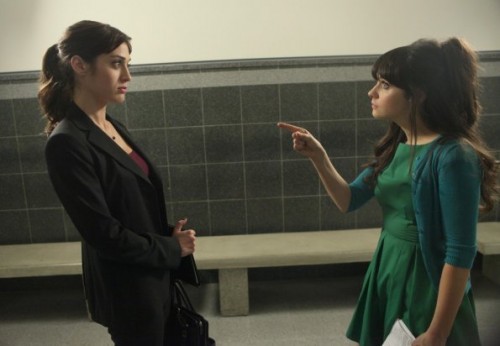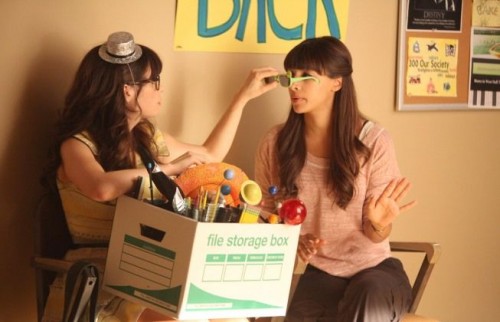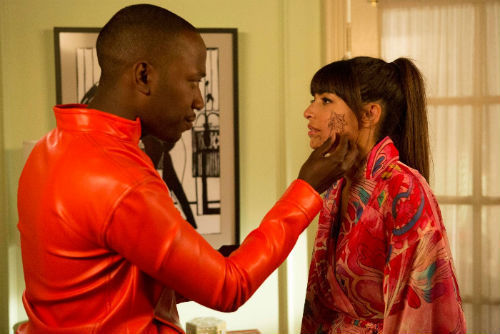
This is a guest post by Susan Mackey.
There is no denying that 2013 has been a tough year for women. As a North Carolinian, I have watched as all but one Planned Parenthood in my state got slated for shut-down due to “health requirements” passed by our Republican lawmakers. At the national level, politicians have made too many rape-apologist comments to keep track of. As a feminist and former Women’s Studies major, it’s important for me to develop thick skin, and with it, an arsenal of uplifting weaponry that will keep me sane and optimistic about our future as women. Which is what has brought me to love the Fox television show New Girl. Yes, New Girl is, ultimately, a sitcom, and it is questionable whether sitcoms can hold up to serious feminist criticism or if we should just laugh along and not take them too seriously. But what’s the fun in that? When “lighthearted” media is so often blatantly sexist (the song “Blurred Lines” and its accompanying video have given feminists enough ire to last the entire year) we should acknowledge those forms of media that, even in subtle ways, subvert the sexist norm.
The premise of New Girl is as follows: Jess (played by Zooey Deschanel) is a recently-single thirty-something-year-old woman who moves into an apartment with three men: Nick, Schmidt, and Winston. The underlying feminist elements in New Girl are often subtle, which is what lends them so much power. Just when we’re expecting another average romantic-comedy sitcom, the rug gets pulled out from under us. This happened to me while watching Season 1 of New Girl for the first time. Jess picks up her best friend Cece from the bar and brings her back to the apartment to crash. Jess warns the boys that when Cece’s drunk, “She’s really grabby, really physical, really loose with her body.” Immediately the scenario seems too predictable: a bunch of men will take advantage of a beautiful, drunk girl. In fact, the opposite occurs. Cece practically forces the boys to dance drunkenly with her, while they try clumsily to impress her. It’s an interestingly equal power dynamic; Cece is drunk and thus not in control, and yet, the boys succumb to her every whim. They couldn’t take advantage of her if they tried. The episode takes an interesting turn when Schmidt offers to let Cece sleep in his bed. He “sheepdogs” her into his room, closes the door, and says he’ll sleep on the couch. This scene took me completely by surprise and illustrated how deeply ingrained sexist imagery is in our imagination: I was abruptly surprised by the fact that Schmidt was not going to take Cece to bed when she was drunk. It was a shocking and somewhat sad realization that I expected the wrong thing to happen; it had almost never occurred to me that a man would not take advantage of this beautiful, drunk woman.

Jess vs. Julia: Second Wave vs. Third Wave
Jess is a prime example of third-wave feminism because she is a new image of what independence and power look like. In Season 1, her roommate Nick begins dating a lawyer named Julia. From the first time Julia and Jess met, Julia was standoffish and cold, quite different from Jess who is friendly and bubbly to a fault. When Jess needs Julia’s help getting out of a traffic ticket, Julia tells Jess condescendingly that her whole “thing” (meaning Jess’s ultra-femininity and friendliness) might work in front of a judge.
The tension between Julia and Jess reminds me of the very real tension between those who identify with second wave feminism and those who identify with third wave. Julia has had to combat sexism within her line of work and has done so by taking on traits that would typically be deemed “masculine.” Jess, on the other hand, is unapologetically feminine. When the two women break down and finally have it out in the bathroom of Nick’s bar, Julia tells Jess, “If I acted like you at work, no one would take me seriously.” This is a sad but true fact for women who work in male-dominated fields, like law. However, Jess counters, “Well if I acted like you at work, my students would turn in really weird, dark dioramas.” Second-wave feminism of the 1960s and 1970s often took the physical form of women who were trying to stake their claim in society by emulating men in manner and appearance (think of the “hairy legged man-hater” stereotype of feminists). Third-wave feminists know that female and feminist power can and should be claimed by everyone, including those second-wave feminists, but also by men, people of color, trans-people, and, finally, feminine women. Jess sums up this point perfectly when she tells Julia that even though she works with kids all day and wears polka-dots, “that doesn’t mean I’m not tough, and smart, and strong.”

I got another jolt while watching New Girl when roommate Nick begins dating a stripper, and receives no judgment from Jess or any other female character. Jess supports Nick’s girlfriend’s decision to strip and even pushes Nick to date her because she’s such a headstrong woman. It is so rare in television and in real life to find women who accept other women’s career and life choices, especially if that choice is to work in a sex industry. But that is one tenant of third-wave feminism that has caught on particularly well with young feminists.
The feminist movement, like any social movement, has had its fair share of shameful, or at least embarrassing, moments. Recall the 1968 anti-Miss America pageant demonstration, in which feminists paraded a sheep in front of the event to represent contestants. Organizers of the demonstration later regretted the tone of the protest because it pitted woman-against-woman instead of uniting them against an oppressive institution. Now, in the era of New Girl, feminists have realized the power of female friendships and mutual support.

Female Friendships
New Girl’s ability to portray female friendships accurately is noteworthy. The premise of the show–that a recently single woman moves into an apartment full of men and hilarity ensues–seems clichéd at first. And it is, at times. There are countless scenes of the seemingly hilarious debacles when two genders live together (in one episode, Schmidt finds one of the tampons that Jess has hidden around the house). But, after all, it is a cable sitcom, and so we must cut it some slack. After all, the show does make up for the predictable three-guys-and-a-girl scenario with scenes of genuine friendship among women. For starters, Jess has a diverse group of friends (for television standards); her best friend is an Indian woman (Cece) and her other friend who appears regularly is a lesbian (Sadie). Within these women there is no gossiping or snarky behavior. When Jess suspects that Nick’s aforementioned girlfriend Julia may not like her, she confides in Cece and Sadie for their support. Nick tries telling the women that they’re imagining things, but Jess points out to Nick something about female relationships that is all too true: when girls fight, a lot of it goes unsaid. There is real conflict between the women in New Girl, but none of it is the catty back-stabbing behavior that we are used to seeing on television.

Writing Diversity
Unsurprisingly, New Girl’s main character, played by Zooey Deschanel, is an attractive white woman (despite the show’s best efforts to portray her as awkward, she is still undeniably cute). For this reason, New Girl is not particularly revolutionary in its racial makeup. With the advent of Orange is the New Black, feminist viewers have gotten a taste of race done right in television (although, not without problems; OITNB has been called a “modern slave narrative” because of its use of a white protagonist as a vehicle to portray black and Hispanic characters). However, New Girl’s ability to successfully joke about race deserves notice. OITNB has garnered a lot of praise–and rightly so–for addressing race in a serious and respectful manner. But New Girl is a sitcom, after all, and has to be funny to be successful.
Modern Family, another sitcom, positions itself as a, well, modern representation of American families. Unfortunately, many of their jokes rely on tired clichés about race and gender (including the nagging wife, the fiery Latina woman, the effeminate gay man, the crotchety old Conservative white man). One episode in particular that made me roll my eyes consisted of the family’s newborn baby conveniently throwing up any time gay marriage was mentioned. It seems to me that Modern Family is trying to get away with these lazy, stereotypical jokes by positioning them as ironic; after all, how can it be offensive if it’s purposefully trying to be modern?

New Girl, while driven by a traditional female protagonist, has a surprisingly diverse cast. Schmidt is Jewish, Winston is Black, and her girlfriends include an Indian woman, Cece, and a lesbian named Sadie. The show is surprisingly, almost shockingly, successful in its abilities to joke about race and sexuality in ways that are truly original and funny, and not at all hurtful (disclaimer: because I am viewing the show from a straight, cisgender, white point of view, it is always possible that my privilege allows me to miss offensive humor). One episode in particular delves into the issue (or rather, the perceived issue) of Winston being the only Black housemate. Upon seeing Winston interacting with a group of strangers who are Black, Schmidt begins to fear that Winston is not being “his blackest self.” The episode continues with Winston taking advantage of Schmidt’s naïve idea of what it means to be Black. Instead of Black stereotypes being the joke (i.e., Black people smoke crack), Schmidt’s assumptions, laced in liberal open-mindedness, are the joke. (We’re laughing at Schmidt for having the assumption that Winston smokes crack.) Along the way, clever jokes of racial differences are made: Schmidt tells Winston that both of their “people” have done great things for America; African Americans have produced some of the best jazz music, while Jews have produced some of the best managers of jazz musicians. Another episode concludes with three white roommates taking turns at making Woody Allen jokes, while Winston simply ads, “Yeah, I have nothing to contribute here.” New Girl doesn’t pretend racial differences don’t exist; it acknowledges them, laughs at them, and moves on.
At the end of the day, it’s difficult to assess how great an impact a sitcom can have on society. Can twenty-five minutes of cable television enact real change in a society so permeated by racism, sexism, and every other damaging –ism? I’d like to think so. The people whose minds need to be changed are not always the ones marching on the streets, reading feminist blogs, and participating in grassroots activism. They are the ones sitting on their couches, watching television. So if a show like New Girl can subtly inject feminist values into the mainstream canon, that is something to celebrate. And now, more than ever, feminists need something to celebrate.
Susan Mackey is a recent graduate from Appalachian State University. She lives in Charlotte, North Carolina, where she teaches preschool and writes about art and feminist issues in her spare time.